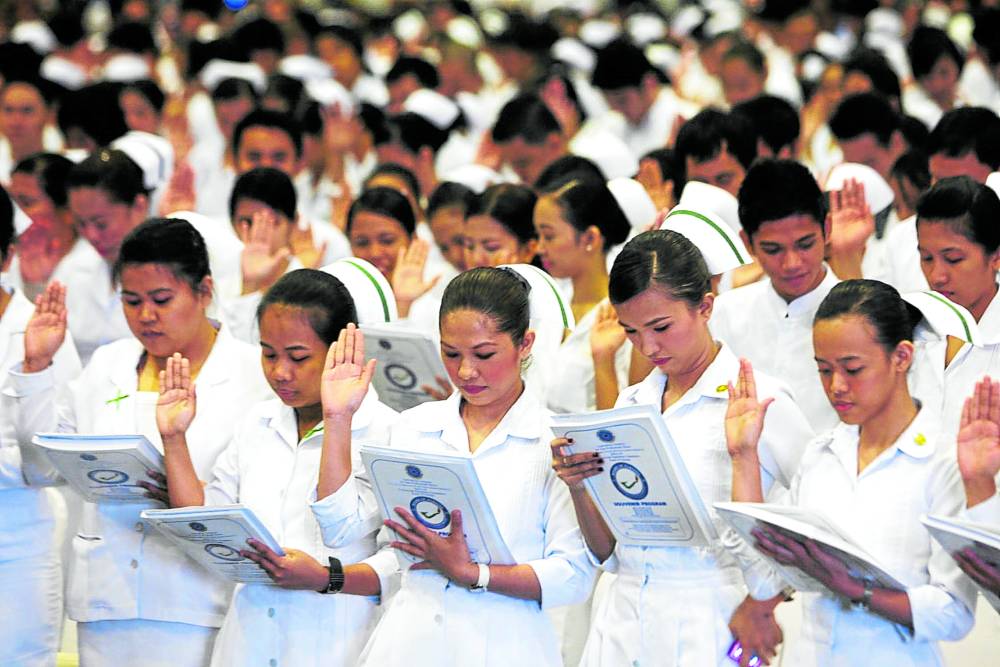
INQUIRER FILE PHOTO
To address the lack of nurses in the country, the Commission on Higher Education (CHEd) has proposed a shorter curriculum program, which will allow those who complete one to three years of nursing studies to get “exit credentials” and join the profession.
Under the suggested shorter program, students who finish a year in nursing school can get a certification to become a nursing aide or assistant. At this point, their competencies should include basic nursing skills in giving safe and appropriate care. For those who continue on to their second or third year, they can also leave the program and receive a diploma to become a nursing associate, community health nurse or associate maternal and child nurse.
Only those who complete the four-year nursing course will receive a bachelor’s degree and become registered nurses.
At a press conference on Thursday, CHEd Chair Prospero de Vera III said that they would facilitate the signing of memorandums of agreement between the private sector and higher education institutions on the direct hiring of nursing graduates in health-care facilities, particularly those with “exit credentials.”
Citing data from the Department of Health (DOH), De Vera said that 51 percent or 316,405 licensed Filipino nurses had migrated to other countries.
On the other hand, only 175,900 or 28.5 percent were serving in private and public health institutions in the country, while 19.7 percent of them were underemployed, unemployed or working in other sectors like business and information technology.
“Enough number of licensed nurses, but majority are either not practicing or migrant workers,” De Vera said.
READ: 12 hours now the work norm for nurses
According to him, the CHEd was considering other immediate or short-term interventions to address the nursing shortage problem, including tapping nonpracticing licensed nurses and upskilling and reskilling those who failed nursing licensure exams.
He said that there was also a need to focus on helping repeaters and failed examinees because, between 2017 and 2021, the number of those who failed the nursing board was higher than who passed based on the data of the Professional Regulation Commission.
To help upskill and reskill these nursing graduates, the CHEd will team up with industry or hospitals to provide them more exposure to clinical areas and community immersion, De Vera added.
Another option would be to offer them other job opportunities to help augment the needs in the country’s health-care system.
‘Asking for more nurses’
On Wednesday, President Ferdinand Marcos Jr. directed the CHEd to come up with solutions to address the country’s nursing shortage.
“We have to be clever about the health-care manpower. Our nurses are the best. We are competing with the rest of the world for them. All the presidents, prime ministers I have talked to are asking for more nurses from the Philippines,” he said during a meeting with De Vera in Malacañang.
Health department officer in charge Maria Rosario Vergeire, who was also present, said that the DOH was doing its part by assessing the status of the proposed legislation on the Magna Carta for Public Health Care Workers and the Philippine Nursing Act while doing a study on the standardization of salaries for nurses, doctors and health-care workers.
READ: Continuing agony of Filipino nurses
Last year, Marcos acknowledged the need to raise the salary of nurses in the Philippines, but he admitted that the government might not have enough funds for this.
He said the government was also looking into providing scholarships for nurses and other medical workers to encourage them to stay in the country.
—WITH A REPORT FROM NESTOR CORRALES
RELATED STORIES
Nurses’ lament: ‘Gov’t not giving us reasons to stay’
Celebrating nurses: Why investing in nursing is essential